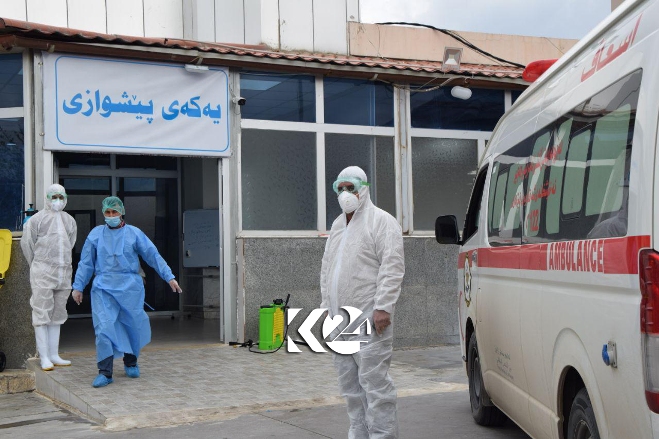COVID-19: Kurdistan announces over 250 new infections, 10 fatalities

ERBIL (Kurdistan 24) – The Kurdistan Region’s Ministry of Health announced 10 deaths and, for the second day in a row, more than 250 new infections of the coronavirus. In the past 24 hours, officials recorded 254 infections and 10 deaths among those who had contracted the highly contagious disease.
A ministry statement detailed that 55 people have been newly quarantined, bringing the number of individuals under the protective measure to 1,304 individuals in 20 different locations. Also, in the past day, health workers conducted 2,274 tests, making for a total of 138,831 of them carried out since the first outbreak of the pandemic in the autonomous region.
The Health Ministry’s statement indicated that the total number of infected people in the region since the emergence of the virus reached 6,657 individuals, 4,270 of whom are considered active cases and still receiving medical treatment. Breaking the total numbers of infection down by province, 1,533 occurred in Erbil, 4,748 in Sulaimani, 178 in Duhok, and 198 in Halabja.
On Thursday, health figures demonstrated that more than 300 health staff in Sulaimani province, especially those who work in hospitals and clinics that treat COVID-19 patients.
“I have been infected with the COVID-19 virus, but due to lack of doctors and health staff, I am obligated to continue working,” Mazin Fryad, the head of government medical laboratories in the province, told Kurdistan 24 in a statement.
When the number of cases witnessed a notable uptick and crossed into the lower hundreds of daily infections in late May, the gap between the number of active cases and recovered patients has only grown larger.
Fatalities due to the disease have also grown substantially with regional health officials warning it is likely they will continue to climb. Describing the situation in grim terms on Tuesday, health ministry spokesman Mohammed Qadir warned on that “the number of coronavirus infections is increasing drastically,” adding that “the threat of the virus lies with infected individuals who are not showing any symptoms.”
Read More: Kurdistan health ministry says new COVID-19 cases 'increasing drastically'
On Thursday, the Iraqi Ministry of Health and Environment announced it had recorded close to 2,200 new coronavirus cases and over 100 more deaths due to complications related to the disease in the past 24 hours.
Read More: COVID-19: Iraq announces 110 deaths, 2,184 new infections in 24 hours
Today's figures released by Bagdhad do not include the most recent developments in the Kurdistan Region, which has its own health ministry and typically announces results later in the day. As such, Kurdistan's figures are usually added to the following day's national tally.
Since late May, Iraq has been recording increasingly higher numbers of new coronavirus infections and deaths, even as authorities reintroduced partial curfews in efforts to curb the spread of the virus. Amid the crisis, health officials have repeatedly expressed fears of a collapse of the national healthcare system.
In efforts to aid Iraq and the in curbing the outbreak of the pandemic on Thursday, the World Health Organization (WHO) recently stated it was supplying Iraq with 300 oxygenation devices.
The representative of the World Health Organization in Iraq, Adham Ismail stated that "WHO has allocated a shipment of medical aid to Iraq from its warehouses in the Emirates city of Dubai." He added that "the shipment is 300 oxygen devices that will be distributed to government hospitals in cooperation with the Iraqi Ministry of Health."
On June 10, the organization's representative in Iraq stated that the premature resumption of trade with Iran, by both Iraq and the Kurdistan Region, had been a significant factor in the dramatic spike in new cases of the deadly disease.
Read More: WHO: 'Breach' of health regulations, trade with Iran behind new COVID-19 spike in Iraq, Kurdistan
he coronavirus has infected more than 10.7 million people worldwide and killed over 518,000 according to data compiled by Johns Hopkins University. The actual figures could be dramatically higher due to insufficient testing capabilities and underreporting.
Editing by John J. Catherine
